Fintech Village: Plans for the Future of the Former UConn West Hartford Campus

Audio By Carbonatix
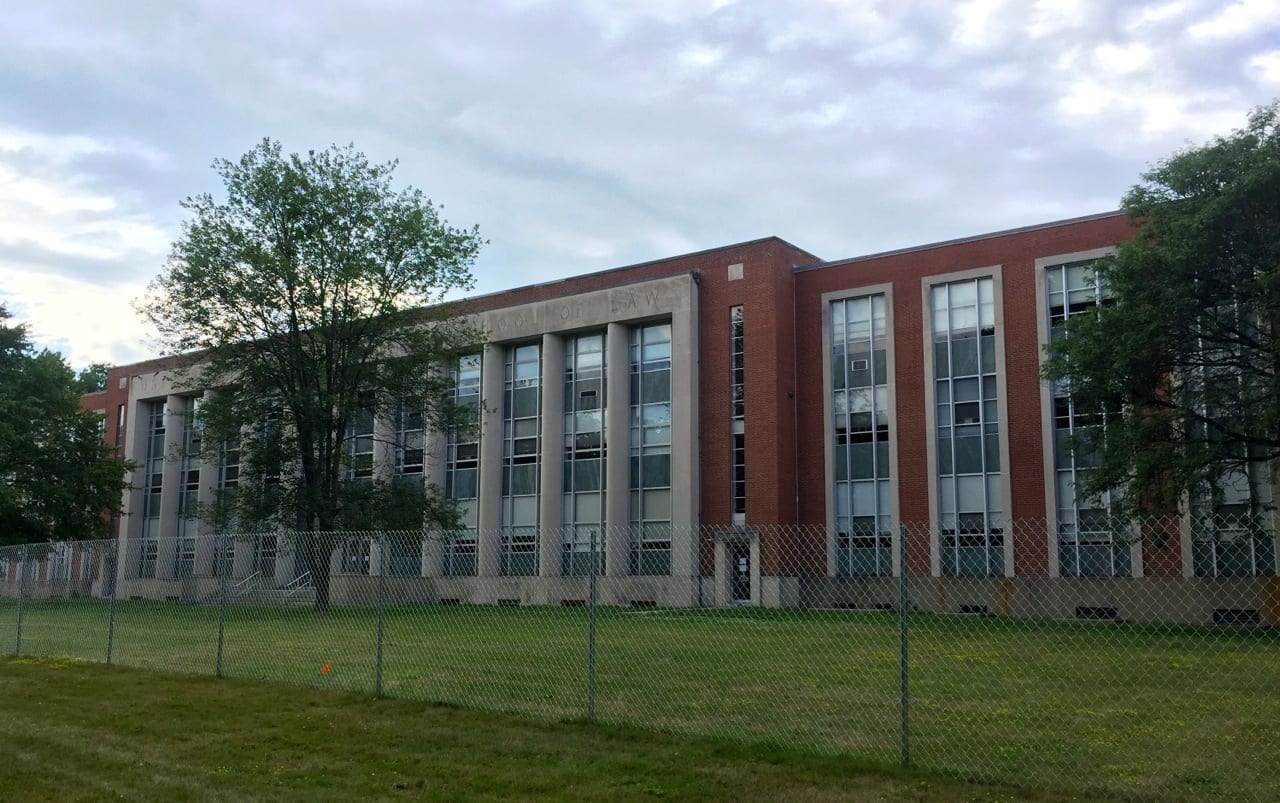
The former UConn West Hartford library was to have been renovated, but demolition is the only way to effectively remove all of the environmental contaminants. Photo credit: Ronni Newton (we-ha.com file photo)
A purchase and sale Agreement has been executed, Seven Stars Cloud Group will soon officially purchase the former West Hartford campus from the University of Connecticut, and here’s what West Hartford residents can expect to happen to the campus with zoning, environmental remediation, and future occupancy.
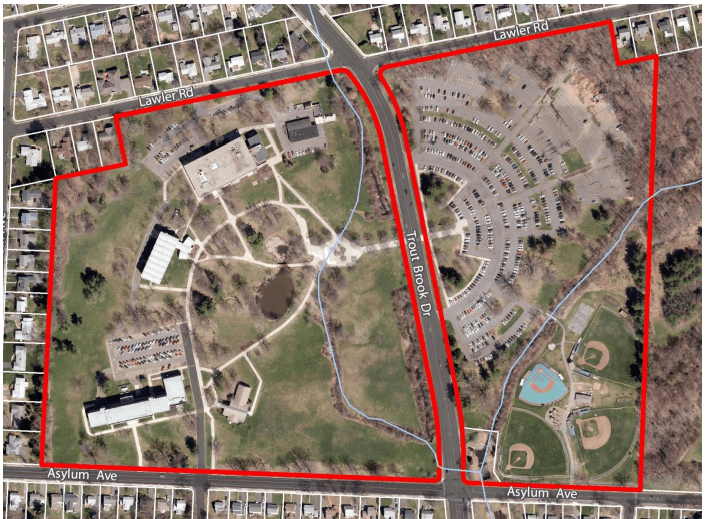
Map of UConn property. Town of West Hartford website
By Ronni Newton
It’s been nearly six years since UConn first announced its plans to vacate the West Hartford campus and move to downtown Hartford, and since then the future of the 58-acre property has been the subject of much discussion by the town, the state, the University, neighbors, and potential developers.
It’s a bucolic piece of property – mature trees, shrubs and flowers, and broad lawns punctuated by several footbridges. It’s also zoned residential, completely surrounded by residential areas, and much of the property is in a floodplain. The east side of the property contains a little league field as well as a prized accessible Miracle League of Connecticut field.
The goal of having the property developed so that it can contribute to the growth of the town’s grand list has been an important one for town leaders, and while residents say they want that as well, when the town conducted a community visioning process there was an overwhelming desire to have a large part of the site kept as parkland. People don’t want traffic, don’t want asphalt, but want tax dollars to flow in.
A bit of history

The former UConn West Hartford campus is 58 acres, much of which is wetlands. The property is currently vacant, with the exception of some geese. Photo credit: Ronni Newton (we-ha.com file photo, December 2017)
It’s not often that a town like West Hartford, which is nearly fully-developed, has a large parcel of land in the middle of town become available. Initial thoughts in November 2012 – when UConn announced that for multiple reasons, including not wanting to spend $25 million on renovations to the campus – it would seek to relocate to Hartford, were that either the University of Saint Joseph or University of Hartford might want the property.
Neither institution expressed a need or desire to own the property, and countless hours of discuss have taken place about its future. Some town leaders have seen it as potentially transformative, but at times others may have stopped just short of calling it a “white elephant.”
In November 2015, UConn officially decided it would sell the property, and because statute requires that state-owned property first be offered to the town in which it is located, West Hartford began considering a purchase. In January 2016 the Town Council authorized then-Town Manager Ron Van Winkle to negotiate with UConn and conduct environmental studies, but then in February 2016, Weiming Education Group, an international school based in China, expressed a desire to purchase the property.
In March 2016, Weiming made an offer to purchase the campus from UConn for $12.6 million, and under statute the town was then given the right of first refusal. At a public information session attended by hundreds in May 2016, that was intended to be about whether the town should exercise that right, many residents instead took the opportunity to express passionate opinions about the proposed sale to Weiming. Most who spoke said they preferred having the town purchase the campus. A week later, the town negotiated a deal to purchase the campus for $5 million – the lower price in part because of uncertainty by UConn about Weiming’s ability to get its plans approved by the Town Council, which is the ultimate land use authority.
Fast forward to December 2017, the discovery of greater-than-expected PCB contamination, a revised purchase price of $1 million, seven extensions of the due diligence period, and the town terminated its purchase and sale agreement with UConn.
UConn was then free to market the campus to potential buyers, and at the same time the town began a robust community engagement process to develop a vision statement for the property, which was adopted by the Town Council in April 2018. The vision statement was shared with UConn so that potential purchasers would know what the town would ideally like to see happen with the property, and what uses would most likely gain eventual Town Council approval.
On July 3, 2018, at a press conference with Gov. Dannel P. Malloy at the State Capitol, Seven Stars Cloud Group announced its plans to purchase the campus from UConn for $5.2 million, to locate its headquarters there as part of its goal of developing the campus into a financial/technology (fintech) hub. An estimated $283 million investment, the project is expected to create at least 330 jobs over the next five years. The project will receive a $10 million loan through the governor’s First Five Plus program for capital renovations, which can be forgiven if the job creation targets are met. Seven Stars agreed to purchase the campus “as is,” and to assume the responsibility for environmental remediation.
The town was given one last chance to purchase the property, at the same exact terms as Seven Stars had agreed to, and on July 19, the Town Council voted unanimously to decline to purchase it. Mayor Shari Cantor, who is also a member of UConn’s Board of Trustees, recused herself from that vote, and has recused herself from all other discussions of the sale of the campus to the town, both as mayor and as a UConn trustee.
The purchase and sale agreement has been executed, and Seven Stars is expected to close on the deal in September.
Bruno Wu’s vision

Bruno Wu. Courtesy photo
What was formerly the UConn campus will be called “Fintech Village,” Bruno Wu, the Chinese-American CEO of Seven Stars Cloud Group, confirmed in a phone interview late last week. He was originally using “Chain Valley” as the working name of the development, but said that Fintech Village better describes the future global technology hub.
“We are committed to being a very good citizen of this community for decades, if not for centuries,” Wu said. “We’re here for the long haul.” Prior to returning to Beijing, he had spent time in West Hartford touring the former campus, and meeting with town and state officials.
“This is much beyond just artificial intelligence [AI] and blockchain,” said Wu of his plans to develop the property. Those are the technologies that Seven Stars is working in, but the collection of companies that will be locating in Fintech Village, he said, will be involved with multiple aspects of big data and cloud technology.
Blockchain, while not yet a household word, could transform the future financial world. It’s complex, but in very simplified terms is a cryptographically secure chain of linked records, and the technology behind Bitcoin. The technology has many other applications, Wu said, and because it has the ability to “fractionalize,” blockchain “democratizes the distribution process.”
Once an asset has been digitized and securitized, he said, it become tradable. The records, while remaining completely anonymous, are accessible. Smaller units of larger assets, like Real Estate Investment Trusts for example, can be sold more easily. “It helps illiquid assets become liquid,” Wu said.
Wu plans to further his own business interests in the artificial intelligence and blockchain space, and said that Fintech Village will include dozens of companies broken down into four separate operations on the West Hartford campus.
One operation will be the Global Centre for Digital Revolution (C4DR), to be led by Eric Van der Kleij, a British fintech and blockchain entrepreneur who also serves as chairman of the Advisory Group and an adviser on fintech and blockchain for The UK Government’s (DIT) Global Entrepreneur Programme.
Van der Kleij is the force behind London’s Level39, an incubator hub for fintech companies that Wu said attracted 53,000 visitors and now includes 200 companies. (See more from a conversation with Van der Kleij below.)
“He’s part of our team now,” Wu said.
While the C4DR hub in London is mostly start-ups, the global hub in West Hartford will not be focused on just research and development but rather will be “ready-to-go technology from around the world,” Wu said. “The ready-to-go market will come to Connecticut … for actual implementations.”
Plans are for C4DR to be located in the former UConn library building, which fronts Asylum Avenue.
Another operation will be the headquarters of Seven Stars Cloud Group (SSC). Wu said that the company “represents the last seven years of our group’s investment in the blockchain space, a leader as a service provider of fintech and asset digitization.”
Wu said that SSC has four blockchain engines that are ready to be assembled and put into use – making the company poised to become the first in the world to put artificial intelligence and blockchain powered technology to use on a large scale.
Fintech Village will also house 15-20 other companies that are owned by Sun Seven Stars, a private media and investment company in China that Wu also heads.
The fourth operation will be a central services group for Fintech Village, including a data center, human resources, administration, legal, and more.
Wu is anxious to get going, but said he understands the need for zoning approval before anything can happen. “We are in the midst of doing a whole plan to be presented to the West Hartford authorities for zoning approval,” Wu said. As of now, the plan is for a combination of renovation of the existing buildings and construction of new facilities.
“We plan on retrofitting the existing architecture, but also building to accommodate the [Fintech Valley] campus.
C4DR and Eric Van der Kleij
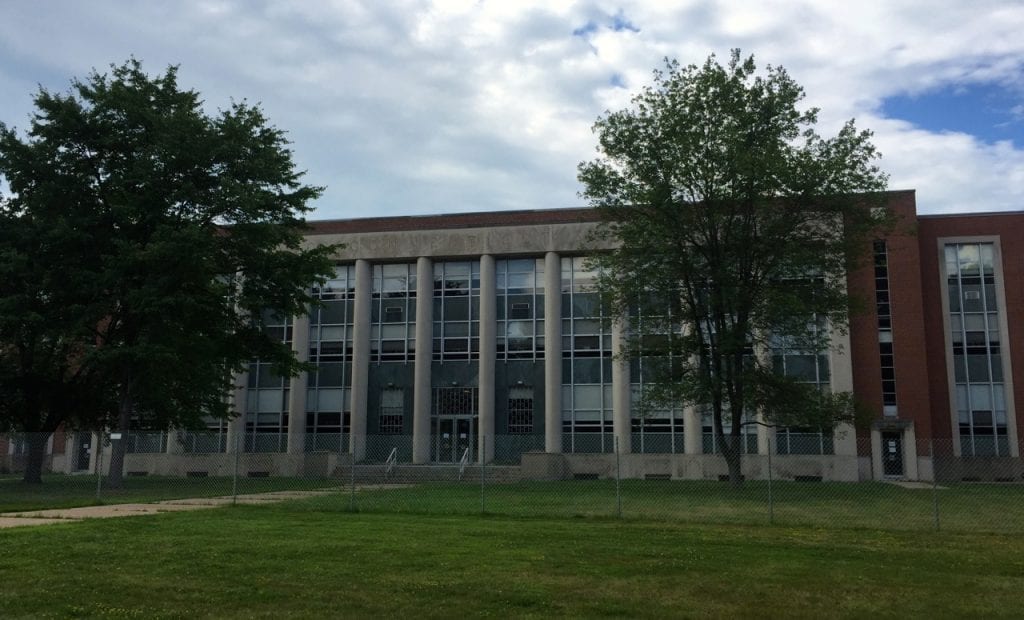
The Global C4DR, which will be run by Eric Van der Kleij, will be located in the former UConn library. Photo credit: Ronni Newton
Eric Van der Kleij, CEO of the Centre for Digital Revolution (C4DR), who helped transform London’s Canary Wharf area with the establishment of the Level39 fintech hub, said that his plan for the operations in West Hartford is to build on the success of his past experience.
Level39 has brought together nearly 200 start-ups, focused on the fintech industry. It’s not only served as an incubator for the businesses, but it’s also had a positive impact on the economy of the area.
Van der Kleij referred to the work that takes place at Level39 as “digital foundry,” where ideas and projects are generated from scratch. Its location in close proximity to financial institutions and other major corporations has been an asset, he said.
Van der Kleij has partnered with SSC, and will head up the Global Centre for Digital Revolution in the former UConn library building, he said. It will focus on companies that are just beyond the incubation phase, ready for validation, to take the next step.
“As we build the hub, we’re going to make it very porous,” Van der Kleij said. A likely focus is the risk management industry.
C4DR will be very accessible, with a major educational component to the operation. Artificial intelligence, and blockchain, should really become part of a business curriculum, Van der Kleij said.
“It needs to be accessible by businesses and schools,” Van der Kleij said, in addition to be accessible to the community as a whole.
“I hope this becomes regarded as an asset of knowledge for the community,” said Van der Kleij.
“Traditional industries are being threatened by digital and what we have developed is helping traditional business be part of the innovation,” he said. “We don’t want them to be the victims.”
Through C4DR, he wants to reach out to businesses and to the academic community.
What needs to happen before operations can begin?
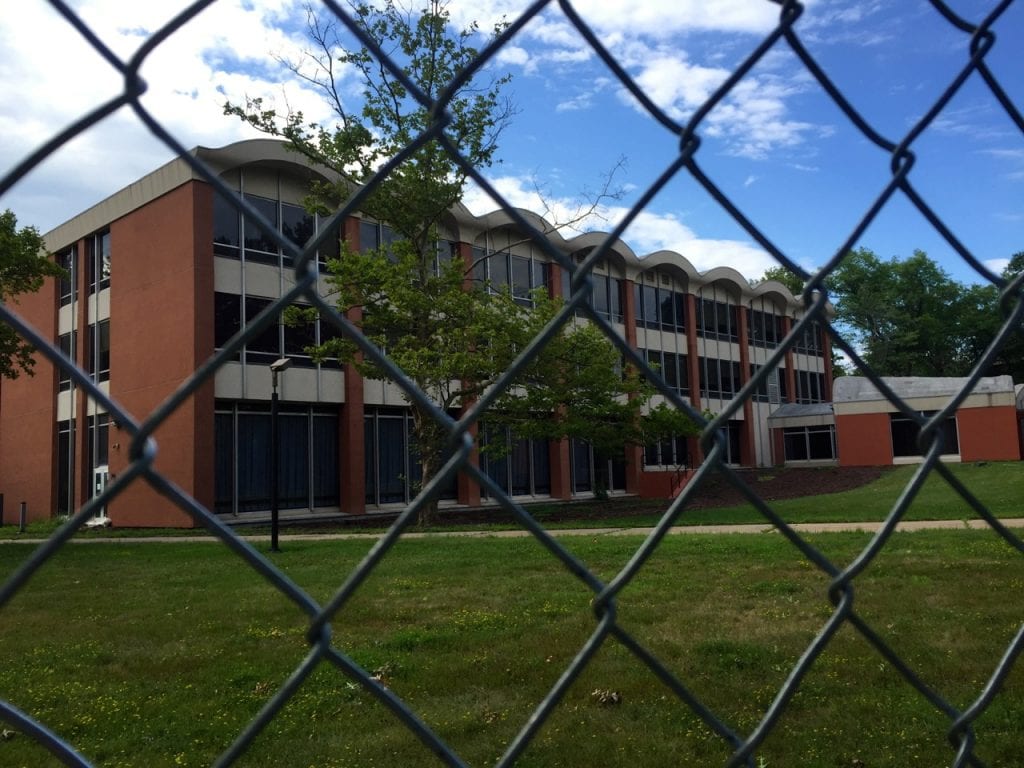
The former UConn School of Social Work is still surrounded by a six-foot tall chain link fence due to the presence of PCBs on the site. Photo credit: Ronni Newton
Director of Community Development Mark McGovern and Town Planner Todd Dumais were among those who attended a meeting with Seven Stars Cloud Group’s development team on Aug. 1 to discuss the project, and both agreed that it’s a work in progress.
McGovern said that even once SSC officially owns the property, they will not be able to occupy it right away.
“In order to utilize the property they will need a zoning change, and what we anticipate will be a Special Development District approval,” McGovern said.
A zoning change is needed for any use of the property other than single-family residential, even educational use, he said.
While school buildings in residential areas generally have special use permits in place, which can be approved by the Town Planning and Zoning Commission (TPZ), Dumais said that the state isn’t required to go through the same permitting process for its property. “There’s no special use permit with UConn because it’s owned by the state,” he said.
There is no option for a provisional agreement to use the property while awaiting completion of any zoning applications, Dumais said.
McGovern and Dumais said that they have made the need to work through the town’s zoning process clear to SSC’s design and development team, and they have also made sure that the vision statement approved by the Town Council has been shared with the team.
SSC’s plans for physical changes to the campus have not been finalized yet.
“They have a vision for the campus which involves utilizing some of the existing campus and some new construction,” McGovern said. The initial conversations focused on the concept as well as land use.
McGovern and Dumais said that SSC is “very welcoming” to the town’s input, and regular meetings, at least monthly, will likely be held with the team as the plans are solidified. The process of zoning change is likely to take several months once plans are submitted, a public hearing is announced, the hearing is held, and a vote is taken.
“It was an important first step today,” McGovern said of the Aug. 1 meeting. “We look forward to an application to the town on this very exciting opportunity.”
PCB cleanup

The former UConn undergraduate building is enclosed by a six-foot chain link fence due to the presence of PCBs in the building and soil. Photo credit: Ronni Newton
There’s actually another important issue that must be addressed before SSC can occupy the campus, and that’s the presence of polychlorinated biphenyls (PCBs) in the buildings and soil.
Three of the buildings – the former undergraduate building, library, and School of Social Work – were all built in the same era, and like many buildings constructed from the 1950s to 1970s have PCBs in the building materials. Those three buildings are currently surrounded by a six-foot high chain link fence in part to keep the public separated from the contaminants. The other two buildings on the campus were constructed after PCBs were banned and are not impacted.
Chris Collibee, the spokesperson for the Connecticut Department of Energy and Environmental Protection (DEEP) as well as PCB Coordinator Gary Trombly and Supervising Environmental Analyst Lori Saliby of DEEP’s PCB Division, provided We-Ha.com with an outline of what has to be done to make the site safe for occupancy.
“The buildings are impacted with PCBs and the soil investigation is not complete yet,” Trombly said. The remediation of the soil is rather straightforward, he said, but the required work on the buildings is more complicated, and will also depend on the extent of renovation and whether or not all or part of the structures will be torn down.
From the perspective of PCB cleanup, “it’s easier to bring them down,” Trombly said.
“It depends on so many variables, including what the complete investigation shows,” Saliby said regarding how long it will take to clean up the site.
“If they repurpose [the buildings] it will cost more than hauling them off,” Trombly said of the contaminated material. The $8 million secured line of that SSC is required to have in place as part of the purchase and sale agreement “might be plenty, or might not be enough,” he said.
While the extent of contamination remains somewhat unknown, the remediation process itself has standard protocols in place. “This is standard PCB remediation, with established methods,” said Collibee.
Trombly said that there are a variety of disposal facilities, permitted landfills where the materials will be brought. The site that will be used depends on the characteristics of the materials.
SSC will be making the decision that is in the company’s best interest, from a time and cost standpoint. Trombly said it’s not uncommon to include plans for remediation within the construction plans, so that the permitting is taking place all at the same time.
Trombly said that DEEP has not yet been informed of the firm that SSC will be using to assist with the remediation. They have worked with both Fuss & O’Neill and Milone & MacBroom on behalf of UConn and the West Hartford. Since UConn technically still owns the property, work is not expected to begin until after the closing, which will likely take place in September.
When the remediation is complete, both DEEP and the United States Environmental Protection Agency (EPA) will have to sign off on it, Collibee said, ensuring that the work has been done properly and that the site is safe for the public.
The DEEP team does not yet have plans from SSC, so cannot comment with a more specific time schedule.
“DEEP is ready and willing to work with the new owners, so the work will be done safely and properly,” Collibee said.
“We’re willing and able to work with the new entity to get this resolved,” Trombly said.
Why West Hartford?
This is a question many have asked.
Wu said that when the decision was made to relocate the Seven Stars Cloud Group corporate headquarters, they were approached by many communities.
“West Hartford is one of the four or five top gourmet towns in the country,” Wu said, only partially joking about that being a major reason, and acknowledging that he appreciates the town’s restaurant scene.
West Hartford’s proximity – two hours from New York and Boston, and not too far from Philadelphia or Washington, DC – was a major factor. “There’s a very big pool, more than 100 universities,” he said. “It’s in the eye of four metropolises.”
A local talent pool will be needed as companies locate to the site. As opposed to Level 39 in London, which is focused on incubator companies, Fintech Village will be a middle level “go-to-market hub,” for companies that are ready to execute their strategies.
“In West Hartford you can have a decent life, and we can hire locally,” Wu said.
Although some headquarters have departed, the Hartford area is still an insurance hub, the insurance capital of the country, and Wu said that blockchain and artificial intelligence presents multiple solutions for the insurance industry to strengthen company balance sheets, to improve risk management.
Also, he said, West Hartford “is a great place for people to raise families.” He noted the quality of the schools, and nearby assets like Elizabeth Park’s spectacular rose garden.
The Hartford area also has significance to the Chinese, Wu said. The “Mission Boys” were sent to the Hartford area at the end of the Boxer Rebellion, in the late 19th century to go to high school, and then went on to Yale, Harvard, and Columbia. Many of the students returned to China where they made significant contributions to a variety of industries.
At the announcement of the plans to purchase the campus from UConn, Wu made strong statements about maintaining the property’s parklike setting, and he reiterated that, telling We-Ha.com that the grounds will be made even more beautiful and will remain open for public use and enjoyment.
Ideally he’d like to move a C4DR into the former library building as soon as possible, he said.
He does understand that his enthusiasm will be tempered by the need to remediate the PCBs, and said there’s a team in place that is working on that. A preliminary assessment of the grounds has been received, but further assessment is needed, Wu said.
“We will make sure the necessary remediation takes place, so it’s safe for everyone,” Wu said.
Wu’s business is complicated, but even though there is still some fluidity to the concept, he’s very willing to explain his vision, and has pledged to be responsive. “We will always be open to answer questions and integrate ourselves into the community,” he said.
Fintech Village will make its mark on not only West Hartford and the Hartford area, Wu said, but the state, New England, and the entire east coast. “I’m hoping this will change the DNA of this region,” he said.
Seven Stars is already ahead of the game in blocktech and financial/technical services, and will be aggregating the best technologies, Wu said. They aren’t planning to be a “disruptor,” but rather an “enabler” providing solutions to existing businesses.
“Every asset is getting digitized,” Wu said. “It’s unstoppable, irreversible.”
To the West Hartford residents who might not be all that interested in the nitty gritty of the business, Wu’s message is: “Come enjoy the park.”
Like what you see here? Click here to subscribe to We-Ha’s newsletter so you’ll always be in the know about what’s happening in West Hartford!



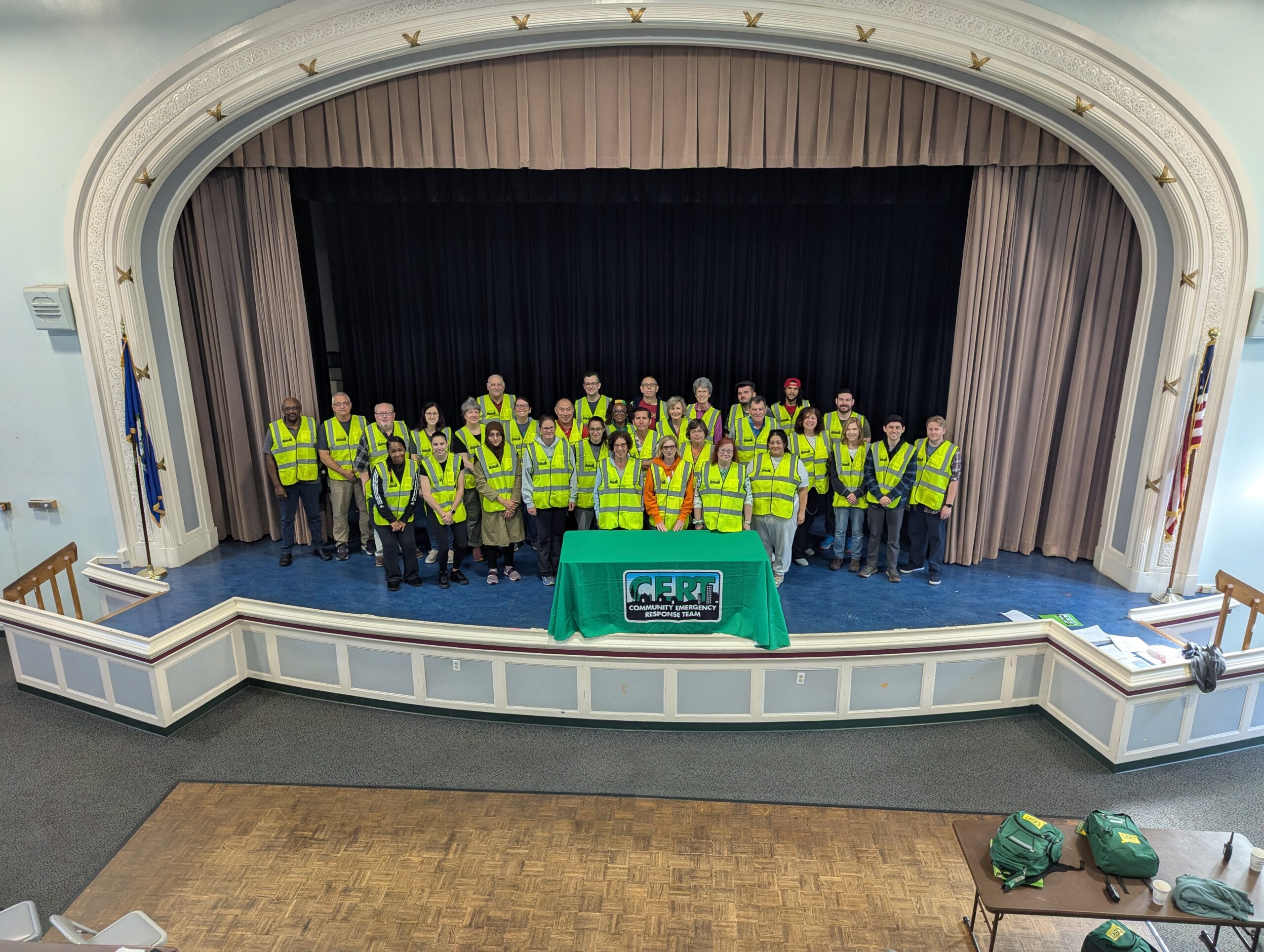
[…] A history of UConn’s decision to sell the campus, through the announcement in July 2018 that Ideanomics (th…. […]
[…] A history of UConn’s decision to sell the campus, through the announcement in July 2018 that Ideanomics (then k…. […]
[…] For information and background about West Hartford’s previous history with the campus, the purchase plans, and interviews with Ideanomi…. […]